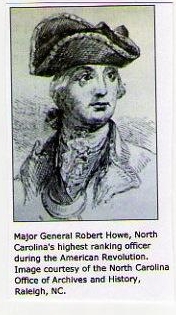Robert Howe (1732 - December 14, 1786) was a major general in the Continental Army during the American Revolutionary War. His great-grandfather was James Moore, colonial governor of South Carolina. He owned "Howe's Point" plantation at the mouth of the Cape Fear River in Brunswick County, and "Clarendon" in Bladen County, North Carolina.
Born to a prominent planter in Brunswick County, North Carolina, Howe was educated in England and, upon his return, was elected to the colonial assembly in 1764. Serving in the provincial North Carolina militia, Howe accepted a commission as a captain in 1766. He was first stationed at Fort Johnston (at the entrance of the Cape Fear River, (at present-day, Southport, NC). He was later promoted to Colonel of Artillery during Governor Tyron's expeditions against the Regulators in April-July 1768 and April-May 1771.
In 1775, Howe was elected to the Provincial Congress, where he would be appointed Colonel of the 2nd North Carolina Regiment on September 1st of that year. Supported by Col. William Woodford, Howe defeated Lord Dunmore, the Royal Governor of Virginia, on December 9th at the Battle of Great Bridge. Following this victory, Howe was promoted to Brigadier General of the Continental Army on March 1, 1776, and assigned to support Maj. Gen. Charles Lee in his command of the Southern Department of the Continental Army in late May of 1776.
Howe was promoted to major general on October 20, 1777, and led an expedition to St. Augustine in British Florida soon thereafter. Facing the problem of a divided campaign, the invasion would eventually force Howe's retreat. Attacking again in the spring of 1778, Howe faced similar difficulties of leading Continental forces, as he had no authority over either the Georgia and South Carolina militias.
After the failure to capture St. Augustine, Howe was replaced in December of 1778 as commander of the Southern Department by Maj. Gen. Benjamin Lincoln. However, before Lincoln could arrive, over Christmas 1778, Howe was forced to abandon Savannah, Georgia, on December 29 after a brief battle with British forces led by Archibald Campbell. Again, Howe did not have authority over the militia until very late in the campaign and was later acquitted in a court martial exonerating him from blame of the city's capture.
Serving under Gen. Anthony Wayne, Howe saw action at the Battles of Stony Point and Varplank's Point on July 16, 1779. After holding commands at West Point and the espionage network in the Hudson Highlands, Howe was transferred to the army of George Washington during a mutiny of Continental soldiers in New Jersey in January of 1781. Putting down the revolt after executing two of the ringleaders, another mutiny in Philadelphia disbanded after news of Howe's approach in June of 1783.
After the war, Howe faced severe debt although he returned to North Carolina a hero. He was elected to the state assembly before his sudden death on December 14, 1786. As a man, Howe was something of a playboy and won a reputation as a horrid womanizer. More than a few of his comrades considered him to be very pompous. His chief failing, a strange one considering his political background, was his lack of ability to get along with a number of state and local politicians, including South Carolinian Brigadier General Christopher Gadsden with whom he fought a duel. On the other hand, Howe did retain the support of a number of national political leaders, including George Washington and Henry Laurens.
Biography from Benson J. Lossing in his Pictorial Field-Book
of the Revolution [with minor edits]:
Robert Howe was a native of Brunswick County, North Carolina. History bears no record of his private life. He was in the Legislature in 1773. He appears to have been one of the earliest and most uncompromising of the patriots of the Cape Fear region, for we find him honored with an exception, togehter with Cornelius Harnett, ehn royal clemency was offered to the rebels by Sir Henry Clinton in 1776.
He was appointed colonel of the first North Carolina regiment, and with his command went early into the field of Revolutionary strife. In December of 1775, he joined Woodford at Norfolk in opposition to Lord Dunmore and his motley army. For his gallantry during this campaign, Congress, on February 29, 1776 appointed him, with five others, brigadier general in the Continental Army, and ordered him to Virginia.
In the spring of 1776, British spite towards Gen. Howe was exhibitied by Sir Henry Clinton, who sent Cornwallis, with nine hundred men, to ravage his plantation near old Brunswick village. He was placed in command of the Southern troops in 1778 and was unsuccessful in an expedition against Florida and in the defense of Savannah.
His conduct was censured, but without just cause. Among others whose voice was raised against him was Christopher Gadsden of Charleston. Howe required him to deny or retract. Gadsden would do neither and a duel ensued. They met at Cannonsburg and all the damage either sustained was a scratch upon the ear of Gadsden by Howe's ball. Major Andre wrote a humourous account in rhyme of this affair in 18 stanzas. Bernard Elliott was the second of Gadsden, and Charles Cotesworth Pinckney the second of Howe. The duel occurred on August 13, 1778. After this affair, Howe and Gadsden were warm friends.
